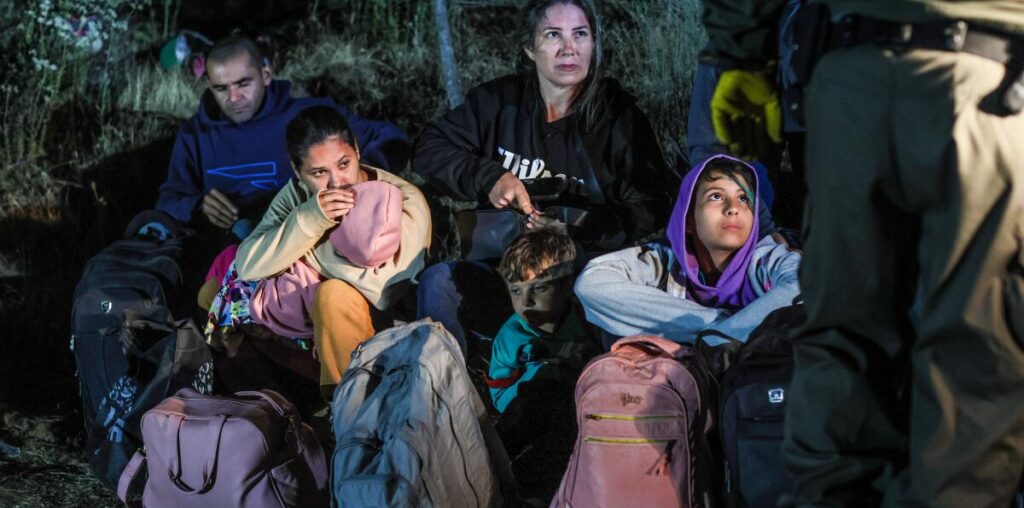HUEHUETOCA, Mexico — In a forlorn stretch of high desert outside Mexico City, a dozen migrants trudged along beside a set of railroad tracks, hoping to jump on a freight train that would take them closer to the United States. They said they were only vaguely aware of the U.S. presidential election — which was a just few days away — and their role in it.
“I don’t know much about American politics,” said Santiago Marulanda, 38, who had traveled from Venezuela with with his wife and two children and hoped to make it to California. “Whoever wins, wins. But I know this: Whoever the victor, things won’t be easy for us as immigrants.”

Migrants wait to load buses in a border patrol holding area below the Camino Real International Bridge near Eagle Pass, Texas, in September 2023.
(Robert Gauthier/Los Angeles Times)
Illegal immigration has been one of the biggest issues in the presidential race. Former President Trump has vowed to deport millions of people he routinely describes as “invaders” and “criminals” — and Vice President Kamala Harris has pledged to reduce illegal entries.
“Trump has a big mouth, but he doesn’t scare me,” said Kevin Ociel Canaca, 25, who is from Honduras and was planning to go to Houston.
He said he had been living and working there until being deported last year, leaving behind a son, now 3.
“If you’re a migrant, you’re going to suffer whoever is president,” Ociel said. “Even if you work hard, someone is going to want you kicked out of the country. That doesn’t stop us.”

Hundreds of migrants walk in Eagle Pass, Texas, in September 2023 to a U.S. Border Patrol area to be loaded into vans and transported to a processing center.
(Robert Gauthier/Los Angeles Times)
Record numbers of asylum seekers arrived at the U.S. border during the first three years of the Biden administration. In June, the president imposed tough new restrictions on asylum that dramatically reduced the number of migrants entering the country — an achievement that Harris has touted in her campaign.
Under intense pressure from Washington, Mexican officials have aided that effort, intercepting northbound travelers on roads and trains and in airports. In the first eight months of the year, Mexico detained nearly a million migrants, more than double the total during the same period in 2023.
Rather than deporting these migrants — the majority of whom are from Latin America — Mexican authorities have transported most of them to the country’s far south, near the Guatemalan border.
Undeterred, many simply turn around and renew their northbound journeys, dodging criminals, crooked cops and Mexican immigration agents.
“The Mexican migra has detained us multiple times, taken away our cellphones, beat us up, and sent us back to the south,” said Yancarlis Caldera, 29, one of hundreds of migrants camped out in a squalid tent city outside the colonial-era Roman Catholic Church of Santa Cruz and Solitude in Mexico City.
She and her partner left Venezuela in September, leaving three children behind.
“I’ve been all over Mexico at this point,” she said. “I now know Mexico better than my own country.”

Migrants and asylum seekers gather in a makeshift camp near Jacumba Hot Springs, Calif., in May after crossing the border through rocky, mountainous terrain.
(Robert Gauthier/Los Angeles Times)
Many squatters in the tent city log in each day to the U.S. government app CBP One in hopes of securing an asylum appointment at the border and being allowed into the United States. Appointments are limited, and it is common to try for weeks or months without success.
The daily quest has taken on increased urgency for many migrants as the U.S. election has approached. Trump has vowed to scrap CBP One.
“What will we do if CPB One is gone?” asked Caldera, standing in front of her tent, which was covered with a black plastic tarp against the rain. “No one here is going back to Venezuela. There’s nothing for us there. We will get to the United States one way or another.”

A group of nuns distribute food to migrants resting along the train tracks in Huehuetoca, Mexico, in May 2023 as they look to board a freight train heading north, the day after U.S. pandemic-related asylum restrictions called Title 42 were lifted.
(Marco Ugarte/Associated Press)
That was also the sentiment among people interviewed along the train tracks north of Mexico City, where migrants have long hopped rides north on the freight network known as La Bestia. The hundreds who once gathered by he tracks have diminished since the Mexican crackdown, but several groups were still trying their luck.
“We’ve been waiting for months for an appointment through CBP One,” said Dinorah López Rojas, 25, who had traveled from Guatemala with her brother, husband an an uncle. Appointment or not, all were determined to make it to the border and eventually Southern California.
“Yes, we’ve heard that there may be deportations after the elections in the United States,” she said. “But I’m not sure about the candidates. I just hope we don’t get sent back after risking so much.”
As an oncoming train rumbled in the distance, López and her family picked up their luggage in hopes that it would stop or slow down so that they could clamber aboard.
Special correspondent Cecilia Sánchez Vidal contributed to this report.

